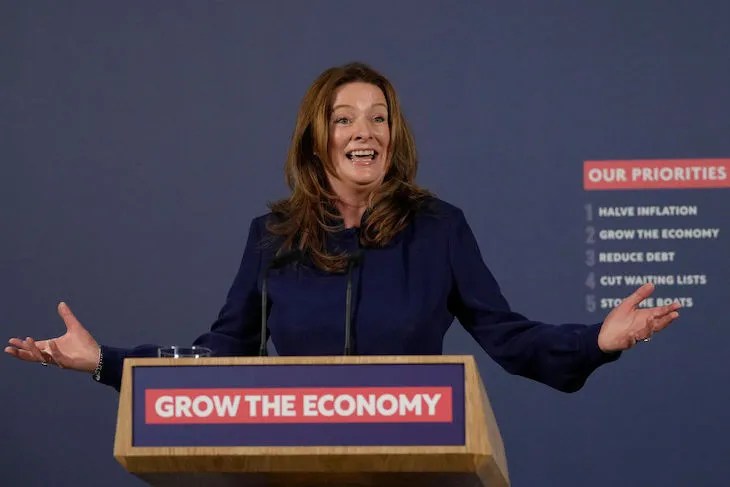Gillian Keegan’s Commons statement on the school concrete crisis will not be the most memorable contribution the Education Secretary made today: that award goes to her hot mic moment a few hours before where she appeared to suggest that people should be grateful for what she was doing and that others hadn’t been doing anything at all. Both could of course be true, and though she didn’t repeat what she had described in her apology as her ‘choice’ language, she did make points to MPs that backed up her ‘fucking good job’ argument.
It was a very uncomfortable session, naturally, because Labour went on the attack about this being the latest sign of a crumbling country neglected by the Conservatives. Shadow Education Secretary Bridget Phillipson called this ‘the defining image of 13 years of Conservative government, children cowering under steel props to stop the ceiling falling in on their heads’. She added that ‘the public realm is literally crumbling around the next generation’, and then widened her argument out to schools more generally, and across the public sector.
But Keegan will have been relieved that Tory colleagues were not on the warpath. They asked questions, of course, and were particularly keen to pin her down on whether the government would be supporting schools with the revenue costs of this as well as the necessary capital spending. On this, Keegan told Priti Patel that the government would consider revenue requests on a ‘case-by-case’ basis, which will only work politically if there aren’t endless cases of schools having to spend an absurd amount of money which the government won’t reimburse. Bernard Jenkin claimed he had more schools with RAAC than any other MP, and said he wanted to commend her on her ‘exemplary statement’ which had shown she ‘personally has certainly taken her responsibilities despite the political dangers she’s put herself into’. But he, like many others, had specific questions about the capital funding being available to rebuild a school on his patch which closed earlier in the summer due to RAAC.
Where will this row go next? The problem for Keegan is that while she may well have acted where others might not have, the change of policy from merely monitoring RAAC to seeing it as an imminent danger puts the spotlight on the public realm more widely. This is especially perilous at a time where Tories are neither prepared to talk about it nor able to offer a convincing narrative for why they haven’t rebuilt or refurbished out-of-date public sector estates. It doesn’t matter that 95 per cent of schools aren’t affected, according to Rishi Sunak: the image of some on the brink of caving in will stick with voters whether or not they have children who are supposed to be learning in them.
There are two explanations, none of which are particularly easy to make in public. The first is that the Tories have not actually had a solid 13 years in government: they’ve repeatedly squandered their majorities when they’ve had them at all, meaning big projects just haven’t happened. They’ve fallen prey to the same short-termism that saw Nick Clegg arguing back in 2010 that it wasn’t worth investing in nuclear power because the new capacity would only be available by 2022. Why fix the roof when people in the future would benefit from it, rather than being able to press release its success tomorrow? You can’g say either of those things in a Commons statement or a clip to broadcasters. It’s not fully clear whether the Conservatives have acknowledged that they are true to themselves, though. Opposition may give them more time for that.







Comments